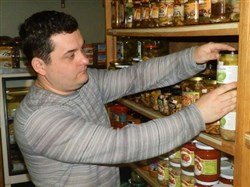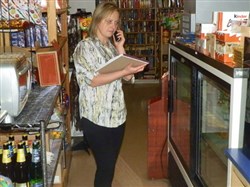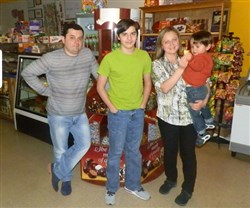VOL. 38 | NO. 14 | Friday, April 4, 2014
Thompson Lane market a neutral zone in Russia-Ukraine conflict
With Russian troops pushing against his homeland’s borders, you might expect Ukraine native Yuriy Kvaternyuk to be wary.
The same, of course, could be said for his partner in life and business, Yevheniya Kvaternyuk, a native Russian.
Their family business – Aleksey’s Russian and Eastern European Market on Thompson Lane – melds both cultures and more.
Depending on heritage or homeland, customers have divergent views on the Putin power-grab that confounds war-weary Western nations.
“My family moved to Ukraine from Siberia in Russia because my dad was tired of the cold,” says Yevheniya – “call me Jane” – who found love and began a family with Yuriy in Vinnitsa, about three hours’ drive from Kiev, Ukraine’s capital.
This market is a peaceful, neutral territory, where flags from both nations hang from the ceiling, likely unnoticed by those who escape into the savory warmth of Aleksey’s in pursuit of caviar, Moldovan salami, Bulgarian vegetable dip, Russian and Ukrainian candies and over-the-counter remedies for everything from colds to colon cancer.
“I don’t know what is going on there,” says Jane, wrapping thinly sliced Gouda for a customer. “Well, I do know what’s going on, but I don’t know what is right. I try to stay out of it.

Yuriy Kvaternyuk works the stock inside Aleksey’s Market, his family’s business on Thompson Lane.
-- Tim Ghianni | Nashville Ledger“There are some who support Russia, some support Ukraine,” she says, as that customer makes his way past the Western Union desk and turns by the pickles and condiments – most labeled in Cyrillic letters – on his way to the front door.
“I just listen to them. I can’t tell them what I think. I had one customer on Sunday who was very happy about what is going on in Crimea (where the people voted to bolt from Ukraine and rejoin Russia). I don’t know if it is good, but at least he is happy.”
The Cold War’s rebirth and its threat to heat up at Ukraine’s borders worries the couple. Jane’s family has moved to Nashville, but Yuriy’s parents remain in Vinnitsa.
Even as he expresses concern, Yuriy proudly asserts that the besieged nation of his birth no longer is his home.
“We are American citizens,” he says. The Kvaternyuks and their son Maksim, now 13, moved to Music City 11 years ago. Another son, Daniel, a native-born American, is 2.
Nashville was the U.S. destination of choice when the young couple decided to seek something better than the life that had them sharing an apartment with Yuriy’s family while they struggled to survive.
“We never could get ahead,” says Yuriy, rattling off the string of jobs, from deliveryman to car dealer, he had in Ukraine.
“My friends was in Nashville,” says Yuriy. “Like all the millions of people: We came for a better life. And yeah, we love it here.”

Yevheniya Kvaternyuk talks with a supplier while taking inventory and placing an order for Aleksey’s Russian and Eastern European Market, the family’s business on Thompson Lane, near 100 Oaks.
-- Tim Ghianni | Nashville LedgerJane’s pale blue eyes gleam as she works the cash register beneath a wall sign advertising today’s special is a bowl of borsht for $4.50. Another whiteboard advertisement – in precisely hand-printed Cyrillic -- promises people will be satisfied with the food or they will get their money back. (I asked for a translation). Satisfaction-or-money-back guarantees seem unlikely in Putin’s Russia.
“When people ask where I am from, I say I am from Russia and my husband is from Ukraine, but my boys are 50-50 … American, Ukrainian and Russian. Well, the little one is all-American, since he was born here,” she says, adding that they now are living “the American dream.”
Russians and Ukrainians provide the foundation for the customer base, but they aren’t alone. “We count everyone who speaks Russian” as members of a 7,000-person Eastern European settlement here, Jane says after a cheerful exchange in that tongue with a tiny woman who has bought a pound of bacon and Moscow-made chocolates.
“Everybody from the old Soviet Union: Ukraine, Belarus, Uzbekistan, Kazakhstan, Georgia, Russia. How many is that? I probably left some out.”

The family that works together: Yuriy Kvaternyuk and his wife and business partner Yevheniya (aka “Jane”) with their sons, Maksim, 13, and Daniel, 2. Maksim often helps his folks at the market.
-- Tim Ghianni | Nashville LedgerOther former Iron Curtain refugees – Romanians, Polish, Czechs, etc. -- also find flavors of home either in the deli cases filled with varieties of cheese, meat and smoked fish or on the shelves where items with foreign names look very much like potato chips, cookies, pickles and sauces.
“But we have 50 percent Americans. I mean real American customers,” says Jane. “We have a lot of people from Nashville who are third and fourth-generation Polish people.” They come in quest of items their grandmothers served. “The favorite foods of the Americans is salami, cheese and the perogies.
“We sell a lot of perogies and Polish kielbasa, especially at Christmas and Easter time,” she says. Eight varieties of the ravioli-like perogies – filled with everything from potato-and-cheddar to sauerkraut-and-mushroom – occupy one freezer case.
“Best bread in the world,” says Yuriy, when a customer, waiting for his sausage to be sliced, asks about the overflowing basket of fresh loaves atop the deli case. As many as 50 freshly baked loaves of German bread come from the oven in the back of the store each day.
While the Kvaternyuks proclaim this “a family business,” the name above the door facing the shopping strip wedged between Mattress King and Applebee’s is “Aleksey’s” … not “Yuriy’s.”
The couple bought the market eight years ago from Aleksey Khimenko. Not only did the former owner already have a loyal customer base they wanted to build upon, but “it’s cheaper to keep the name on the sign,” says Yuriy.
“Our goals for the future is ‘bigger, bigger, bigger.’ Bigger size, bigger sell, bigger money. For now, it’s OK. I can pay my bills. I have a house in Brentwood. I have a car. I have money for food. It’s a very good life.”
“Some says there is not bad countries, only bad people,” says Yuriy, when pressed on the battle lines being drawn in Europe. “I think the Russian government is making a mistake. They told everybody they don’t want to do a war, but Russian marines surround the borders and Ukrainians don’t know what they gonna do. This is not right.
“I was planning on sending my wife and kids to Ukraine this summer, but now, we don’t wanna fly to Ukraine. It’s very dangerous.”
He’s glad to be surrounded by his family here in the market on Thompson Lane, a half-world removed from his homeland, where Putin’s troops are massed by the borders, clouding the future.
Jane smiles when asked about the dried fish carcasses piled in a countertop plastic tub. “Russians eat them with their beer,” she says, nodding toward a cooler where Ukrainian and Russian beers peacefully coexist.